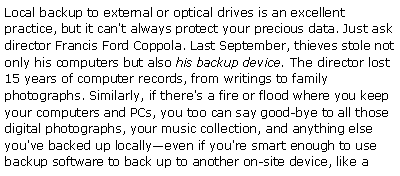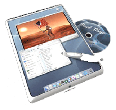
|
3900 Yonge St, Suite 608 North York, ON M4N 3N6
|
|
Phone: 647 288-2882 Cell: 416 897-9931 E-mail: service@absolute-pc.com Newsletter: http://www.absolute-pc.com/Absolute/Newsletter |

Online Backups |

Apple iPadWhat it is: iPad is a book-size version of the iPhone, enlarged, minus the phone, and the camera. The good: Apple has consolidated your Netbook, e-reader, |

|
gaming device, photo frame, and iPod into a nice super-gadget. Features such as Bluetooth, 802.11n Wi-Fi, 10 hours of battery life, optional 3G wireless, and the App Store have many people eager to buy one. The bad: The iPad's large size is as much a hindrance as it is an advantage. The bottom line: The Apple iPad is the first affordable tablet computer worth owning, but it won't (yet) replace your laptop. |

|
hard-drive. You can, of course, store an external hard disk in a safe-deposit box, but that's a hassle, and chances are you won't update it monthly, let alone daily—and certainly not every time you update a file. If you want near-real time off-site backup, an online backup service is the way to go. |